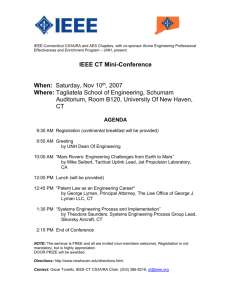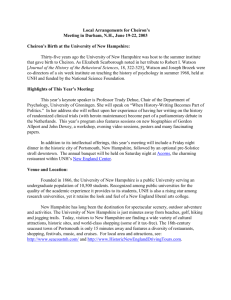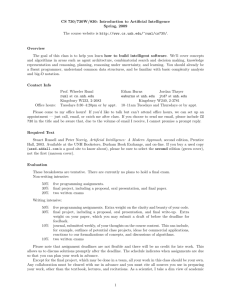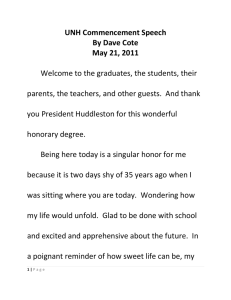College of Engineering & Physical Sciences * Dean Joe Klewicki
advertisement
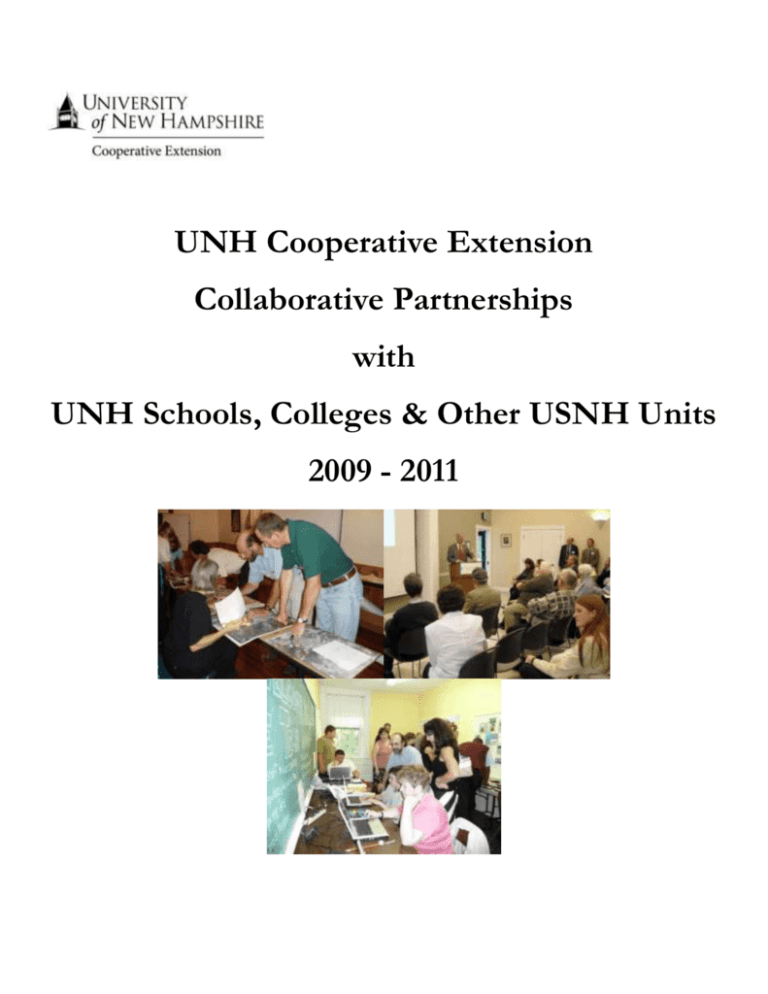
UNH Cooperative Extension Collaborative Partnerships with UNH Schools, Colleges & Other USNH Units 2009 - 2011 Dear Cooperative Extension Partners, We are proud to share a compilation of our most recent collaborative partnerships with UNH Schools and Colleges and other University System of New Hampshire (USNH) units. We strive to be recognized and valued as an integral link between the needs of New Hampshire citizens and UNH’s Land-, Sea- and Space-Grant missions. We take pride in helping individuals and communities “put knowledge and research to work.” As stated in our Strategic Plan, we are committed to responding to significant issues facing the state by engaging with UNH faculty, students and staff across the University. As evidenced by this report, these collaborations involve Cooperative Extension, academic programs, research and support units, ensuring the University’s diverse resources remain responsive to the state’s social, environmental and economic challenges. This report illustrates the depth and breadth of Cooperative Extension’s partnerships with University faculty and staff. Cooperative Extension staff are involved in more than 100 partnerships with faculty and staff from all four USNH campuses. More than 30 Cooperative Extension educators and faculty are involved in these partnerships. Twenty-five Extension faculty hold joint appointments between Extension and Academic Departments, including the College of Life Sciences and Agriculture, College of Health and Human Services and the Institute of Earth, Oceans and Space. Extension staff guest lecture, provide workshops, advise student groups, present at numerous seminars in many UNH departments and serve on academic committees. We are committed to enhancing and expanding our collaborative partnerships to more effectively conduct a wide variety of educational programs addressing priority needs throughout New Hampshire. Our program initiatives focus on: fostering development of competent individuals and strong families strengthening New Hampshire communities conserving and sustaining natural resources strengthening the economic impact of agricultural, forest, and marine resources Faculty interested in collaborating with us as we provide research-based outreach to New Hampshire citizens should contact me to learn more about these efforts. I look forward to meeting with you. John E. Pike Dean and Director UNH Cooperative Extension 2 Collaborative Partnerships UNH Cooperative Extension 5 Partnerships 6 College of Engineering & Physical Sciences - Samuel B. Mukasa Civil Engineering 6 6 College of Liberal Arts - Dean Ken Fuld Education Sociology 6 6 6 College of Life Sciences and Agriculture - Interim Dean Jon Wraith Agricultural Experiment Station Biological Sciences Molecular, Cellular, and Biomedical Sciences Natural Resources and the Environment Thompson School of Applied Science 6 6 6 7 8 8 College of Health and Human Services - Dean Barbara Arrington Family Studies Kinesiology Occupational Therapy Social Work Recreation Management 9 9 10 10 10 10 Whittemore School of Business and Economics - Dean Daniel Innis 10 UNH Manchester - Interim Dean Sally Ward 11 Graduate School - Dean Harry Richards 11 Libraries - Dean Sherry Vellucci 11 Other UNH Centers, Institutes and Units Carsey Institute Complex Systems Research Center Earth, Oceans and Space Institute Joan and James Leitzel Center for Mathematics, Science & Engineering Education UNH Child Study and Development Center Office of Outreach Scholarship Office of Sustainability Other 11 11 12 12 3 13 13 13 14 14 Other University System of New Hampshire Outreach Efforts Keene State College - President Helen Giles-Gee Plymouth State University – President Sara Jayne Steen 4 14 14 14 UNH Cooperative Extension Mission UNH Cooperative Extension provides a direct link between UNH and people throughout the state. In partnership with local residents and volunteers, Cooperative Extension plans and conducts educational programs responsive to New Hampshire people and the issues they identify that are important to them. UNH Cooperative Extension’s mission “provides New Hampshire citizens with research-based education and information, enhancing their ability to make informed decisions that strengthen youth, families and communities, sustain natural resources and improve the economy.” Priorities Broad goals identified through statewide needs assessment and partnerships with other organizations, agencies and academic departments: foster development of competent individuals and strong families strengthen New Hampshire communities conserve and protect land, water and open space strengthen the economic impact of agricultural, forest and marine industries Fast Facts – UNH Cooperative Extension: Provides a network of 99 full and part-time Extension Educator, professional and technical staff located in all 10 New Hampshire counties and on the UNH campuses in Durham and Manchester, as well as at UNH Cooperative Extension’s (UNHCE) Education Center in Manchester, who design and conduct educational programs. Includes 22 campus-based Extension Specialists, the majority located in academic departments, who partner with faculty colleagues in facilitating statewide education and research outreach. Involves 10 county advisory councils collectively comprising 140 members (citizen volunteers, legislators, county commissioners) who help identify local needs and priorities and guide the county outreach activities. Reaches one in four New Hampshire residents with information or assistance, and recruits, trains and supports over 5,000 trained volunteers who work with staff to conduct educational programs to reach a greater number of New Hampshire citizens (e.g., Master Gardeners, Family, Home and Garden Education Center Info Line staff, Lay Lake Monitors, Marine Docents, Wildlife Coverts, Tree Stewards, Great Bay Coast Watch, 4-H Leaders). Links its county offices to distance education networks that provide videoconferencing and satellite downlinks, bringing educational seminars, workshops and training to all parts of the state. Receives funding through a cooperative partnership which includes annual appropriations from federal, state and county governments. Grants, contracts, program fees and private contributions provide supplemental funding. A memorandum of understanding between the U.S. Dept. of Agriculture and UNH defines the University’s responsibilities for program leadership and management. Memoranda of understanding between the University System of New Hampshire and County Government carry out the provisions of state law as reflected in RSA 24:10a. Provides several hundred educational publications and curricula in all program areas, written by UNH Cooperative Extension faculty and staff. Visit our website: extension.unh.edu 5 College of Engineering & Physical Sciences – Dean Samuel B. Mukasa Civil Engineering Ken LaValley, program leader, Sea Grant Extension, and associate director, NH Sea Grant, worked with Research Assistant Professor - Environmental Research Group Jenna Jambeck, and Shane Bradt, Extension specialist, geospatial technologies, and the Blue Ocean Society for Marine Conservation on an outreach scholarship project designed to help identify, monitor and mitigate marine debris through tracking on the shore, underwater and on the ocean. College of Liberal Arts – Dean Ken Fuld Education Malcolm Smith, Extension professor/specialist, collaborated with John Hornstein, affiliate professor, and Sara Leonard, Child Study and Development Center, to present a series of three “Oh Baby” trainings for child care professionals in the state. Sociology Malcolm Smith supervised the scholarship of Megan Henly, a CHE Scholar and Ph.D. student from the Dept. of Sociology in the College of Health and Human Services. Megan served as a team member for both the Child Support Guidelines Review and the NH Work and Family Life Study. Lisa Townson, assistant director, programs, and interim program leader, agricultural resources, collaborated with Sharyn Potter, associate professor and Eleanor Abrams, associate professor, Education, to evaluate the student and faculty mentoring experiences as a result of the Undergraduate Research Conference. Two publications are forthcoming reporting the results. College of Life Sciences and Agriculture – Interim Dean Jon Wraith Becky Sideman, Extension associate professor/specialist, sustainable horticulture production, serves on several committees within COLSA, including the search committee for the Associate Dean of Agriculture, the Organic Dairy Planning Committee, and the Sustainable Horticulture Planning Team. She co-chairs the Sustainable Agriculture Working Group, and chairs the UNH Greenhouse Open House Committee. Agricultural Experiment Station Jeff Schloss, Extension professor/specialist, water resources, is working with Jim Haney, Zoology, and various UNH undergraduate and graduate students as part of an ongoing Hatch Grant study on Blue Green Bacteria Toxins. Shane Bradt also works with Haney to develop a remote sensing technique to detect potentially toxic cyanobacteria in lakes. The Agricultural Experiment Station funds research for the following Extension professors/specialists: Becky Sideman, Catherine Neal, Extension professor/specialist, ornamentals, floriculture, Peter Erickson, associate professor, dairy cattle management, Cheryl Smith, Extension professor/specialist, plant health, and Alan Eaton, Extension professor/specialist, entomology. Biological Sciences Extension faculty contributed to the COLSA horticulture program by teaching courses, drafting new curriculum, and providing input to strategic planning efforts, insuring key stakeholders are involved. 6 Cathy Neal taught two classes this year, as well as coordinated the internship program for the department. Jeff Schloss completed final reporting for a US EPA and NOAA funded, NH DES-managed research project: an investigation into the use of parasitic nematodes for variable leaf milfoil control. The researchers included Garrett Crow, Plant Biology, Eyualem Abebe, Elizabeth City State University, and Kelly Thomas, Hubbard Center for Genomic Studies. Shane Bradt works in the labs of Win Watson and Hunt Howell, professors, to implement GIS mapping for research projects tracking lobsters and fish species in coastal waters in the Gulf of Maine. Brent Loy and Tom Davis, both professors of plant biology, presented their research on plant breeding and genetics to audiences of growers and extension professionals at workshops and twilight meetings at the UNH Agricultural Experiment Station. Becky Sideman integrates work-study students and independent study students into Extension’s horticultural research programs. With a 20 percent teaching appointment in the Dept. of Biological Sciences, she teaches Sustainable and Organic Food Production. She has provided guest lectures in other courses including NUTR 912 (Vitamin Nutrition), PBIO 651 (Plant Pathology), and NR 444 (The Real Dirt). She also mentors several graduate students by serving on the committee of three Ph.D. and two M.S. degree candidates. She is currently the major advisor of one M.S. degree candidate. Cathy Neal serves as coordinator and faculty sponsor for undergraduate students doing environmental horticulture internships for credit. Cathy Neal collaborated with the UNH Stormwater Center on a grant proposal for a similar project in Dover, written by the Stormwater Center and Cocheco River Watershed Coalition that includes several Extension educators including Neal in the grant. Cathy Neal also serves COLSA by serving as chair of the Tuttle Endowment committee that makes funding decisions and oversees the use of the endowment for horticulture. Jim Haney delivered guest lectures for Julia Peterson, Extension professor/specialist, water resources, for the town of Milton. Jeff Schloss is a continuing collaborator for a Hatch Grant on Blue Green Bacteria Toxins with Jim Haney and various UNH undergraduate and graduate students. He also assists with providing field equipment, lab analysis and occasional field support for water resources related courses taught in Zoology and Plant Biology. He advises a number of graduate students and also occasionally serves on their thesis committees. Jeff Schloss co-instructs the upper level course, Multi-disciplinary Lake Management, with Jim Haney. Molecular, Cellular, and Biomedical Sciences Debbie Luppold, Extension Professor/Specialist works with Joanne Burke, Clinical Assistant Professor and Dietetic Intern Program Director, to provide training to all UNH Dietetic Interns. Luppold provided a training on how to teach nutrition to youth to the interns who worked in elementary schools in Manchester and other parts of the state. Debbie also mentored interns for community rotations. Terri Schoppmeyer, educational program coordinator, Nutrition Connections (Rockingham Co.), worked with Joanne Burke, director, UNH Internship Program to provide graduate and undergraduate students with field experience in community nutrition. These experiences included teaching low income audiences and designing educational programs for children. Students worked in elementary school classrooms in Portsmouth and in an after-school program in Raymond. Debbie Luppold, Extension professor/specialist, food and nutrition, works with Joanne Burke, clinical assistant professor and Dietetic Intern Program director, to provide training to all UNH dietetic interns. Luppold and Heidi Bennett, Nutrition Connections program associate from Hillsborough County, provided trainings on how to teach nutrition to youth to two groups of interns who worked in elementary schools in Manchester and Somersworth. 7 Colette Janson-Sand, Extension associate professor/ specialist, partnered with Prof. Tony Tagliaferro and a graduate student, Jorie Allen, to create and deliver a Worksite Wellness Program to Extension staff as part of her research for her doctoral program. David Foote, director, communications and information technology, assisted by delivering the program using Extension’s two-way interactive video network. Becky Sideman collaborated with Tom Kelly and El Farrell, Office of Sustainability, Joanne CurranCelentano and Joanne Burke, professor, Molecular, Cellular and Biomedical Sciences, Raymond Goodman and Dan Winans, Whittemore School of Business, and John Carroll, Department of Natural Resources and the Environment, to develop and implement a new undergraduate major in EcoGastronomy (began Fall 2008). Natural Resources and the Environment Paul Johnson and Frank Mitchell train and advise senior projects course student teams. This course provides students with real world experience in working with local community groups on conservation projects. William McDowell, professor and Water Resources Center director, and Jeff Schloss, work together on a long-term project evaluating the impacts of land use change on water quality. Extension funded a graduate student from 2007-2008 to study ground water quality at Mendums Pond. They both serve on the NH Water Conference steering committee. George Hurt, Natural Resources associate professor, David Burdick, Natural Resources research professor and Jeff Schloss taught a Discovery course for first-year students entitled “How to Change the World,” a result of collaborations initiated through the UNH Outreach Scholarship program. Jeff Schloss advises a number of natural resources students and has occasionally served on thesis committees. He also often guest lectures for Water Resources Management related courses. He is the primary instructor for the department’s Watershed Ecology Summer Institute. Becky Sideman collaborated with Kelly Cullen, Natural Resources associate professor, Charlie French, Community and Economic Development Extension associate professor/specialist, and Robert Mohr, Whittemore School of Business, to develop a proposal to fund a graduate assistantship to study the economic viability of small-scale, sustainable energy alternatives, including on-farm biodiesel production. Charlie French teaches Community and Environmental Planning Perspectives for the Dept. of Natural Resources newly-formed Community and Environmental Planning Program. He also serves on the program’s advisory committee. Last year his students created a film called “Going Green at UNH,” on UNH Cooperative Extension’s YouTube website at http://www.youtube.com/watch?v=HMD0BCKtTKY Karen Bennett, Extension professor/specialist, forestry, instructs students in a field lab about integrating wildlife habitat considerations into woodlot management for John Litvaitis’s wildlife habitat class. Sarah Smith, Extension professor/specialist, forest industry, Karen Bennett and Matt Tarr, Extension associate professor/specialist, wildlife, presented at Associate Professor Tom Lee’s Professional Perspectives class about Extension and the outreach mission of the Land Grant mission. Cathy Neal served as a mentor for PBIO 600 independent study for senior David Moore. Moore’s study was on tapping birch trees for syrup production. Thompson School of Applied Sciences Sarah Smith, Extension professor/specialist, participated in UNH’s Energy Task Force Thompson School of Applied Science Forestry Technician Advisory Committee. She also gave presentations to Thompson School forestry students and members of the UNH Woodlands Committee. She is a member of the UNH Lands Committee and worked with the UNH Tech Camp (CEPS) to set up tour of sawmill during the summer of 2011. She also talked to an Upward Bound class on oral history in July, 2011. 8 Cathy Neal served on an external review panel for the Horticulture Technology program of the Thompson School of Applied Sciences. The panel made recommendations on program strengths, weaknesses and opportunities for improving the program, based on extensive research and conversations with students, alumni, faculty and UNH administrators. The report recommended ways to improve collaborations between the Thompson School and other COLSA departments and Extension so students and the green industry of the state are best served. Terri Shoppmeyer also worked with Nancy Johnson, director, Thompson School of Applied ScienceDietetic Technician Program to provide community practicum experiences for three students. Students worked with adults with disabilities providing cooking and nutrition lessons, three Head Start Centers were provided with active play and healthy eating lessons and an after-school program series in Epping explored cultural eating. Mary Tebo, Extension educator, urban forestry, worked with Regina Smick-Attisano director, Thompson School, Rene Gingras, Nancy Johnson and Rick Macdonald of Dining Services, and civil engineering graduate student James Sherrard on a grant to complete the green roof on Holloway Commons. (The grant didn’t get funded, but it spurred a larger campus green roof team to form to discuss future efforts.) College of Health and Human Services – Dean Barbara Arrington Malcolm Smith co-chaired, with faculty members from seven departments in the College of Health and Human Services including Health Policy, Kinesiology, Family Studies, Nursing, Carsey, the Institute on Disabilities, and Social Work, the first Outreach Scholarship and Community Engagement Committee in the College’s history. A full report was generated in 2011. Family Studies Through a direct collaboration and contract with the UNH Dept. of Family Studies, Family and Consumer Resources Educator Thom Linehan coordinated the Early Childhood Mental Health Consultation Team of Marriage & Family Therapy Graduate Students, who provide mental health consultation to Head Start and Early Head Start Programs. He also taught a two-semester seminar in Early Childhood Mental Health. This project strengthens families by providing direct service and increased capacity of communities to respond to families by increasing the number of professionals with early childhood skills. Malcolm Smith and Michael Kalinowski from Family Studies and Reagan Baughman from WSBE collaborated on the 2010 review of Child Support Guidelines for the State of New Hampshire Department of Health and Human Service. Seven pieces of legislation resulted from the study. UNH Family Studies Department and UNH Justice Studies Program have placed student interns with Extension, working with Rick Alleva, Extension educator, 4-H youth development, Rockingham County and youth and service providers focusing on positive youth development. Interns are trained as 4-H volunteer leaders as well. Karen Blass, Extension educator, family and consumer resources worked with Kristine Baber and other Family Studies faculty and staff to plan and hold a conference for girls, titled, “Stop the Drama and Get Real.” More than 200 participants attended, mostly parents and middle school girls. Malcolm Smith directed a research team including Michael Kalinowski, professor, Family Studies, Reagan Baughman, WSBE, and Sociology Ph.D. candidate Megan Henly, that reviewed the Child Support Guidelines for the NH Dept. of Health and Human Services. The research included visits to six states and resulted in six policy and legislation recommendations. Elizabeth Dolan serves on Extension’s Family Resource Management Advisory Group. The group provides guidance for the programs, publications and activities within Family Resource Management. Malcolm Smith served on both the Graduate, Family Policy and Advocacy Committees of the Dept. of Family Studies. 9 Malcolm Smith supervised three UNH Family Studies practicum students, serving at family resource centers. He also teaches the Family Programs and Policy Course (FS 760) for the department. Kinesiology Mike Gass, professor and chair, continues to provide advice to Charlotte Cross about Operation: Military Kids camp locations and programs. Tara Flippo, Clinical assistant professor partnered with Charlotte Cross to set up a team building program at the Browne Center for the Operation: Military Kids – Speak Out for Military Kids program. Occupational Therapy Barbara P. White, associate professor, occupational therapy, worked with Paula Gregory and 4-H Camp staff on reducing stress and managing their own health throughout the challenges of their summer employment. Barbara P. White, associate professor, occupational therapy, and Paula Gregory co-presented a paper at the May 2009 annual CYFAR (Children, Youth and Families at Risk) Conference in Baltimore, MD. The paper, “A qualitative review of participant experiences in a stress management intervention during pregnancy study” presented findings from a 2007-08 research project. Social Work Operation: Military Kids is partnering with Anita Tucker, assistant professor, on Speak Out for Military Kids program. She will work with teens on team building skills. Recreation Management Paul Shirilla, graduate research assistant, Outdoor Education, provided 4-H Camp staff with an overview of preliminary research findings from a multi-year study of the effectiveness of an intentional residential summer camp experience on the social skill development of pre-adolescent youth. Whittemore School of Business and Economics – Dean Daniel Innis Karen Blass works with Health Services, Peer Education program, UNH Parents Association, Financial Aid Office, Business Office, WSBE and the Alumni Center on Project CASH activities and events. Many departments at UNH have put a link for the Web site on their home web page and regular reports show high usage of the site (weekly “successful requests” averaging around 5,000), with steadily increasing numbers. Alice Mullen, Extension educator, family and consumer resources, lectured on food safety to 97 undergraduate students in HMGT567 Advanced Food and Beverage, taught by Sylvia Marple, assistant affiliate professor. Part of the course requires participating at a gourmet dinner planned and executed by the students. Malcolm Smith collaborated with Reagan Baughman, assistant professor and Michael Kalinowski to present highlights of the Child Support Guidelines review to the Child and Family Law Committee of the New Hampshire legislature. 10 UNH Manchester – Interim Dean Sally Ward Shane Bradt is working with Mihaela Sabin, associate professor of computer science, to develop online GIS and GPS workshops to broaden accessibility to the Geospatial Technology Training Center training materials. Malcolm Smith, through the Family Education collaborative in Manchester, has provided leadership and advice for the Family Education Collaborative and When Work Works, a national initiative that educates and recognizes employers using workplace flexibility as an effective business strategy. Malcolm Smith partnered with Trece Mettauer, coordinator for Community Outreach Scholarship, to conduct a community family life needs assessment for the Family Education Collaborative in Manchester. Mary Tebo worked with UNH Manchester faculty Steve Pugh and Trece Mettaur to incorporate the Natural Resources course into the undergraduate biology curriculum for 2010. Graduate School – Dean Harry Richards UNH Cooperative Extension provides financial support for two graduate assistantships each year. The current graduate assistantships are both assigned to the Natural Resources Department. Libraries – Dean Sherry Vellucci Malcolm Smith conducted a series of trainings for Dimond Library staff on balancing work and family life. Over 50 library staff attended. Other UNH Centers, Institutes and Units Lisa Townson served on UNH’s New Venture’s Team in 2010. The New Ventures fund (a result of the UNH Strategic Plan) was designated as seed money for innovative projects in teaching, research and engagement that could lead to larger and more continuous external funding. Specifically, Lisa served on the team that reviewed and made recommendations on research leveraging proposals for funding. Lisa Townson served as a facilitator for the inaugural Research and Engagement Academy in 2011, providing information to faculty participants on identifying community partners for their engaged scholarly work. Carsey Institute Lisa Townson served along with faculty and staff from across campus, on the search committee for the Carsey Institute director search when Mil Duncan announced her departure from UNH. Malcolm Smith and Kristin Smith, Family Demographer from the Carsey Institute, designed and completed the first representative survey of New Hampshire working parents. The study was published by the NH Division of Economic Security and distributed statewide. Malcolm Smith collaborated with Kristin Smith, Carsey Institute and Ben Amsden, Plymouth State University on conducting the first NH Work and Family Life study. The study included eight focus groups with parents at family resource centers across the state and a survey of a representative sample of New Hampshire’s working families. Results were published in late Fall 2009. Charlie French worked with Sally Ward, Sociology, and Kelly Cullen, Natural Resources and the Environment, to complete an evaluation of resident-owned manufactured home communities in New Hampshire. The 2008 publication addresses the social and economic opportunities and challenges of resident-owned communities. Charlie French collaborated with Curt Grimm and Barbara Wauchope, Carsey Institute, on a grant proposal to the Northeast States Research Cooperative (NSRC) to evaluate the transfer of knowledge 11 from past grant-funded research to community stakeholders. The project will help NSRC to improve the mechanisms by which research findings are conveyed to the broader public for public benefit. Charlie French serves on the Carsey Institute’s Winant Fellowship selection committee. The Winant Fellowship provides four to six students each year with full-time summer work with a non-profit organization or government agency to further their professional interests in public service. Complex Systems Research Center Julia Peterson is working with James Houle and Rob Roseen of the UNH Stormwater Center, Becky Zeiber, Sea Grant Communications, Darrel Covell, UNH Cooperative Extension and external partners on a grant-funded project to provide technical outreach and education related to monitoring the effectiveness of tree box filters (innovative stormwater management devices) recently installed in downtown Portsmouth, NH as part of the city’s State Street renovation. Julia Peterson is working with a faculty team including Semra Aytur, Health Management and Policy, Stephen Jones, NH Sea Grant and Jackson Estuarine Laboratory, and Alison Watts, Environmental Research Group to lead the first Researcher Learning Community from the UNH Sustainability Research Collaboratory, an initiative designed to encourage interdisciplinary sustainability-related proposals and projects. Participants on NH Sea Grant Discovery Cruises into the Great Bay typically meet with research faculty and staff during a visit to Jackson Estuarine Lab. These researchers include Dave Shay (lab manager), David Burdick, Ray Grizzle, Tom Gregory, Steve Jones and students who work with them. Peterson coordinates the cruises with help from Dari Ward and the UNH Marine Docents. Shane Bradt works to bring the expertise of Fay Rubin, Jennifer Lingeman, David Justice and Chris Phaeuf, staff at the GIS database, NH GRANIT, to Extension’s Community Mapping GIS course each summer. Shane Bradt is partnering with Fay Rubin and David Justice, director and information technologist with NH GRANIT, and Steve Hagen, research scientist in the Complex Systems Research Center, to develop GIS tools to identify critical natural resource areas in New Hampshire towns as part of a CICEET-funded project. Shane Bradt is developing outreach materials for Fay Rubin, NH GRANIT director, and Jennifer Lingeman, NH GRANIT database manager, to publicize the NH GRANIT Data Mapper, a free online tool for making maps of NH GIS data produced and housed at the Complex Systems Research Center. Julia Peterson partnered with Jamie Houle, UNH Stormwater Center, to work with coastal communities, delivering two low impact development conferences. Jamie Houle, UNH Stormwater Center, and Julia Peterson partnered with coastal communities and coauthored a community guide to water resource protection and stormwater. The stormwater collection research facility located on the UNH campus filters and monitors various nutrients and salts that enter the treatment area. Two of the “holding areas” were in need of vegetation effective in absorbing the runoff and John Roberts, Extension specialist, turf, and associate professor, plant biology, assisted in the selection of two different turfgrasses for the areas in May 2009 and their performance will be evaluated in the future. Earth, Oceans and Space Institute Julia Peterson is helping with engagement and evaluation of engagement processes for a multidisciplinary mapping project led by UNH faculty Cameron Wake (EOS), Robert Roseen (UNH Stormwater Center), and Fay Rubin (CSRC). The project will result in the creation of new 100-year flood plain maps for the Lamprey River watershed based on current and projected precipitation rates and land use. An off-shoot of this project is a legal research component conducted by faculty and students at 12 Vermont Law School exploring questions of legal authority, measures and consequences for communities interested in using the maps. Mary Tebo continued work with Denise Blaha, Earth Ocean and Space Dept., incorporating climate change education into the Natural Resources Volunteer course (this collaboration began in the late 1990s and continues today. Mary Tebo worked with several faculty and staff of Earth Ocean and Space Dept. to help develop and train volunteers to give Climate Change Education programs. Joan and James Leitzel Center for Mathematics, Science, and Engineering Education Jeff Schloss co-taught the two-week summer UNH course “Watershed Watch” with Barry Rock, EOS/Natural Resources, Elise Sullivan, Molecular, Cellular and Biomedical Sciences, Steve Hale, Leitzel Center, three Elizabeth City State University (ECSU, North Carolina), 12 UNH students, 10 Great Bay Community College students, and five ECSU students. Karen Graham, Leitzel Center director, is a co-principal investigator for the National Science Foundation grant that supports this effort to mentor undeclared majors in an effort to have them declare a STEM (Science, Technology, Engineering or Math) major. Shane Bradt provided hands-on exposure to GPS and GIS technologies for New Hampshire science teachers during the NH-PALS science summit organized by Barbara Hopkins of the Joan and James Leitzel Center for Mathematics, Science and Engineering Education. UNH Child Study and Development Center As the faculty representative on the Tuttle Endowment Committee, Cathy Neal was responsible for leading a committee of industry representatives to approve funding for continuation of “Growing a Green Generation,” a pre-school gardening curriculum developed in cooperation with the UNH Child Study and Development Center. Charlotte Cross worked with Jon Nimmo, associate professor and executive director of the Child Study and Development Center on a collaborative Operation Military Kids (OMK) Hero Pack project, done in partnership with the Child Study and Development Center and the Oyster River Parents of Preschoolers local organization. Office of Outreach Scholarship Thirteen Extension faculty members or Extension educators completed the UNH Engaged Scholars Academy through UNH’s Office of Outreach Scholarship. They work with interdisciplinary faculty teams to develop and deliver outreach scholarship programs to New Hampshire citizens. Lisa Townson assists with the academy, serves as a coach to faculty participants and collaborated with Julie Williams, associate vice president for Outreach Scholarship and Cameron Wake, Faculty Fellow for Outreach Scholarship and Education associate professor, to develop and roll out a Web site that contains the Outreach Scholars Academy curriculum for national distribution. Malcolm Smith presented at the 2009 UNH Outreach Scholars Academy on his experiences working with community partners. Lisa Townson serves on the Undergraduate Research Conference planning committee, assisting with evaluations and VP University-wide Symposiums. Jeff Schloss teamed up with Cameron Wake, Brad Kinsey and George Hurtt to design and teach Freshman Course “How to Change the World.” This discovery course involves students doing research projects for local and statewide community and environmental organizations. John Pike, dean and director of UNH Cooperative Extension, served on a committee to oversee and submit written materials to support UNH’s application for an elective Carnegie Classification as a Community Engaged Institution. Charlie French served on a UNH “Wildcat” stimulus funding team to identify federal grant opportunities falling under the jurisdiction of the US Department of Commerce. A report was completed 13 for the Office of the Vice President for Research. Office of Sustainability Working with Tom Kelly, chief sustainability officer, John Aber, provost and professor, Natural Resources and Bruce Mallory, professor, Education and Jeff Schloss, as a section editor and contributing author, helped shepherd the “engagement” pieces for a book of case studies on how UNH integrates sustainability into its campus, curriculum and research recently published by the University Press of New England. Other Malcolm Smith collaborated with faculty and staff from across campus on two committee formed by the UNH Women’s Commission. One was a campus-wide Work/Life Balance Committee and the other was a newly-formed committee to combat workplace bullying at UNH. Partnership plans are in the works with Operation: Military Kids and Lt. Amada R. Ponn, Army ROTC. Involving UNH ROTC students is a positive addition to the OMK team of resources for programming with military kids in New Hampshire. Other University System of New Hampshire Outreach Efforts Keene State College – President Helen Giles-Gee Debbie Luppold has worked with Karen Balnis, Dietetic Intern Program Director, Keene State College to mentor interns in community rotations. Shane Bradt has worked with Brett Thelen and David Moon of the Ashuelot Valley Environmental Observatory at Keene State College to offer GPS and GIS courses to empower citizen scientists to document wildlife observations. Debbie Luppold works with Karen Balnis, Health Sciences, to provide field experiences with the Nutrition Connections Program. Dietetic interns worked with Christine Parshall, program associate in Cheshire County and Sandy Trybulski, program associate, in Sullivan County schools. Plymouth State University – President Sara Jayne Steen Julia Peterson collaborates with Brian Eisenhauer, Plymouth State University (PSU), on a CSREES grant project on lawn care and water quality. Julia Peterson works with Nick Stevenson, Plymouth State graduate student on a CSREES grant project helping with lawn care outreach products. Jeff Schloss advises a number of graduate students affiliated through the PSU Center for the Environment involved in research on Squam Lake and Lake Winnipesaukee. He also collaborates with PSU on a project investigating watershed nutrient loading into Meredith Bay, Lake Winnipesaukee for the Town of Meredith and the Lakes Region Planning Commission. Scott Meyer, professor, social work, Stephanie Halter, assistant professor, Criminal Justice, Jean Dawson, UNH graduate student, and Paula Gregory completed the final evaluation of the 2003-2009 CYFAR (Children, Youth and Families at Risk) projects. Bob Craycraft, educational program coordinator, Lakes Lay Monitoring Program, collaborates with Brian Eisenhauer and Steve Whittman, adjunct faculty member, as part of an interdisciplinary nine town Newfound Lake watershed natural resource based planning effort. http://www.newfoundlake.org/watershedmasterplan/projectoverview.html 14
